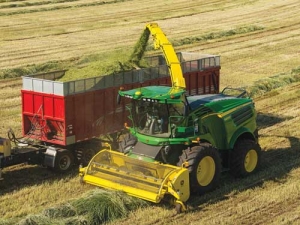John Deere is to add three new models to its 8000 series self-propelled forage harvesters which currently ranges from 380hp to 625hp.
The new 8300 produces 483hp from its Tier 2, 13.5L engine, and the 8700 and 8800 models 755hp and 832hp respectively, from their Tier2, non-EGR, 19.0L units.
Engineers have matched engines to outputs, achieving fuel reductions of up to 6% in maize and 15% in grass.
At the business end, the choice of new 9 series grass pick-ups from 3.0-4.5m is complemented by row-independent headers from 8-12 rows, supplied by in-house manufacturer Kemper.
The headers have automatic speed matching to length of cut, and the feed roller widths are tailored to ensure a well compressed layer of crop is presented to the DuraDrum cutterhead.
Dependent on the model’s power, cutterhead width varies between 686mm and 856mm and can be specified with 40, 48, 56 or 64 knives depending on the crop being harvested.
Other improvements to the series for the new harvest season include wider feeder housings for the larger-engine machines, and improvements to the chute assembly which include faster rotational speed.
An improved drive system for greater durability and the option of the ‘active fill system’ that loads all corners of trucks or trailers, freeing the operator to concentrate on the feed going into the front of the machine.
www.johndeere.co.nz


















